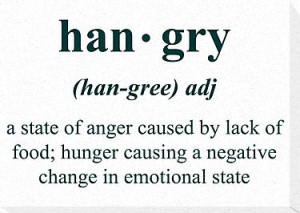You feel it, and – even worse – you hear it. Skipping breakfast and jumping into your four consecutive classes on an empty stomach was by far your biggest mistake of the day (and probably your most frequently made mistake if you can’t break the habit of going breakfastless). As your stomach’s growling grows louder and classmates start giving you weird looks, you know you’ll turn into the Hulk and eat the desk in front of you if you don’t get food as soon as possible.
The word mash-up “hangry” joined the pop culture dictionary about a decade ago (I must have been living under a rock, because I didn’t know about this concept until maybe two years ago) to describe your hunger-induced irritability that prompts slight grumpiness at best and unbridled rage at worst. There’s a science to this, of course. A study conducted last year revealed that low glucose levels in your system result in aggression. Four studies, including both experimental and observational tests, indicate this connection:
Study 1 observed the aggression levels in 62 college students who participated in the experiment in order to prove the causality of the correlation between glucose and irritability. All participants (having fasted for 3 hours leading up to the experiment) received lemonade, but the drinks randomly contained either sugar (glucose) or a sugar substitute (for placebo effect). After allowing the drinks to take their course in the body, participants had “their reaction-times tested in a computerized task against an opponent.” If and when study subjects failed to complete these computer tasks properly, they heard a sound bite similar to radio static (the intensity of which was determined by a fellow study subject). As predicted, subjects who consumed the lemonade with a sugar substitute exhibited more signs of aggression while subjects who consumed glucose in their lemonade were less irritable.
Study 2 served to produce results similar to Study 1. The background information here is that glucose is a substance that increases self-control. Scientists leading the study suggested that “individuals with diabetic symptoms (e.g. difficulty metabolizing glucose) would have difficulty exercising self-control” (study). The study measured the diabetic status, self-control, and aggressiveness of 112 subjects. Final observations upheld the hypothesis, suggesting the correlation between a diabetic’s difficulty with metabolizing glucose and a lack of self-control. This lack of self-control leads to aggression.
Study 3 takes this overall experiment’s concept a surprising route by testing for a correlation between diabetic rates and crime rates in each state of the United States. Based on the FBI’s classification of murder, assault, rape, and robbery as violent crimes, the scientists involved took these crimes into consideration when analyzing crime rates and diabetic rates of 2001. Observations once again lined up with the concept that a lack of glucose leads to aggression as each state’s records established a correlation between the two problems.
Study 4 utilized the findings of the Study 3 by testing if glucose deficiencies across the world could indicate future violent crimes. Scientists gathered data from the World Health Organization to measure the accuracy of the correlation in question in 122 countries and compared their findings with records of violent killings in 2002 taken from Associated Newspapers. Observations of these data remains consistent with the previous studies that indicate a correlation between glucose levels and aggression as countries with high glucose deficiencies also maintained high crime rates.
These four studies argue strongly in favor of the correlation between glucose deficiencies and aggression. The use of both observational and experimental systems solidifies the likelihood for causality. Study 3, however, does not address whether or not the people with glucose deficiencies contributed to the higher crime rates. Without specifying this concept, the theory that causality exists is weakened. This study took a surprising twist by connecting glucose deficiencies to violent killings, but the connection proved to be effective as the scientists’ hypotheses were consistently supported. While I can’t say I’ve wanted to kill someone because of a growling stomach, “hangry” is definitely a real thing. Other sources (Huffington Post, Diabetes, CNN) either cited the same study above or suggested similar mechanisms through other studies.
And now you know. You aren’t just frustrated that your stomach won’t shut up, there’s a biological explanation for your aggression. While it’s suggested that you scarf down some nutrient-rich food, at least keep a granola bar with you at all times lest you snap on the first person brave enough to talk to you while your body runs out of fuel.


I found your topic to be intriguing and different! I liked that you had four different studies, except they all seemed to be pretty similar in some ways, so I would have liked a little more diversity. They also did not go into great detail or deeper than I would have liked. You kind of just gave an overview. Why is that crime rates are more connected to those that are more hangry than others? Because of self-control, but why? You also talked about the biological part of being hangry, but I honestly couldn’t really find much of that. So could you explain more about that? Thanks!
Wow! I thoroughly enjoyed reading this post. That study you found seemed like a really fantastic study. They did a really good job Isolating the many variables in the experiment; and not only did they just do different studies; they linked those studies to other studies and other important events and correlations. I was just as impressed with the complexity of the study as I was with the result. That being said, it does make the result more believable.